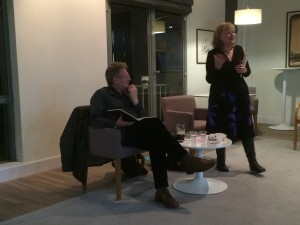This week’s Creative Writing Reading Series saw the, as ever, irrepressible Geraldine  Monk on fine form. Geraldine has been a leading light of the UK innovative poetry scene since the seventies, and during her reading gave us a taster of a wide sweep of her poetry – from her most famous collection – 1994’s Interregnum to one of her most recent – and as yet unpublished – poems, started onlt two weeks ago. This poem, ‘Deliquium’, was written, she says, half-way between Crete and Canterbury (a place which you may be surprised to learn is actually Sheffield – Monk’s hometown) – looking forward to her journey to Canterbury, and inspired by a scrap of paper she found after her holiday two weeks before with the name of her holiday location in Crete and the word ‘deliquium’ written on it – a word which she says, despite having made the note (and she talked about how her note -taking is more a scraps of paper than a notebook affair), she was intrigued by – loving the sounds, but having no idea what it meant. Having looked it up & found four very pleasing definitions – including ‘in a languid, morbid mood’ – a four part poem was born.
Monk on fine form. Geraldine has been a leading light of the UK innovative poetry scene since the seventies, and during her reading gave us a taster of a wide sweep of her poetry – from her most famous collection – 1994’s Interregnum to one of her most recent – and as yet unpublished – poems, started onlt two weeks ago. This poem, ‘Deliquium’, was written, she says, half-way between Crete and Canterbury (a place which you may be surprised to learn is actually Sheffield – Monk’s hometown) – looking forward to her journey to Canterbury, and inspired by a scrap of paper she found after her holiday two weeks before with the name of her holiday location in Crete and the word ‘deliquium’ written on it – a word which she says, despite having made the note (and she talked about how her note -taking is more a scraps of paper than a notebook affair), she was intrigued by – loving the sounds, but having no idea what it meant. Having looked it up & found four very pleasing definitions – including ‘in a languid, morbid mood’ – a four part poem was born.
Monk’s poetry is both innovative and immediate – its eschewals of the conventional rules of grammar allow for a space in which words are both stranger and more present. Take ‘Pendle’, the first poem of Interregnum:
(brooding dislocation)
limits
push
over
iced Pendle water warm English beer
sipspeed under
grazing
headlights
catch
odd eye
starlets
hearts
odd creatures
sometimes missed
sometimes hit
warm runny things
cold unmoving tarmac
(lascivious sprawl conscious and livid)
Here the poem both enacts the brooding quality of dislocation, and allows for quite brilliant dislocations and relocations of meaning – for example the way the outriding ‘sometimes hit’ forces the doubleness of meaning in ‘odd creatures / sometimes missed’ to shift emphasis. The poems work, in rhythm and content, with song and childhood games – a play which can be quite sinister – Monk’s very physical reading of the ending of another of Interregnum’s poems
and the stained black habit
flapped away
cawing
taa taa taffa-teffy
taa taa taa-a…
was menacing, and followed by an account of growing up in a Catholic school, so scared of the nuns who taught her that she wet herself rather than interrupt a music lesson.
What this type of writing, in its sparse denseness, allows, is a method for voicing – an allowing in of what has been repressed in dominant linguistic and historical accounts. Its aim is, as Monk says, ‘evocation rather than saying something’, and what Monk evokes, repeatedly, is women in history whose speech has been silenced. Most interesting, perhaps, is Interregnum, which is a poetic account of the Pendle Witches – seventeenth-century residents of Pendle hanged as witches in Lancaster. As the blurb to the book says ‘They had fallen victim to a language-magic far more potent than their own’, and Interrgnum fights back with its own language-magic. The project is both explicitly feminist, and geographically located – Monk being originally from Lancaster and deeply involved in its language, spaces and history. This is both a full history – involving thorough archival research (which, on the Pendle Witches was admittedly rather slighter in the early nineties than now – Interregnum was ahead of the curve in what is now a booming industry of the history of witchcraft within academia) and a pared down one – this research then stripped back to its barest words.
Similar, though interestingly different in intention, was Monk’s reading from 2005’s Escafield Hangings, which re-writes Mary Queen of Scot’s letters to her cousin, Queen Elizabeth I during her imprisonment in Sheffield in the section ‘Unsent letters’. Mary, who admittedly had much more access to a voice than the Pendle Witches, is, accordingly treated with more humour – Monk was particularly amused by the refrain ‘I don’t complain’ in her original letters, sandwiches as it is in what Monk calls a catalogue of ‘whinging’. Nonetheless, these letters again write of how women’s struggles with voice are involved in their struggles for power.
Monk also read from Songings – a text which later turned into a musical collaboration with Martin Archer and Julie Tippetts called Angel High Wire, Ghost & Other Sonnets (2009) and 2011’s Lobe Scarps & Finials – which she described as a monthly diary of November 2010, and an attempt to encounter head on the recurring urge to write about the moon in her poems – her answer, she said was to ‘bombard a year with moons – moons from around the world and down the ages’.
She ended back in Crete – with a tribute to a matriarchial culture of goddesses – a poem to Artemis of Ephesus – and a quibble with her evolution and present day reputation as a virginial huntress – the Ephesian Artemis was originally the ‘great mother godess’, and Monk’s Artemis was characterized by abundance. One can see why the similarly effusive Monk likes her.
Kat Peddie
